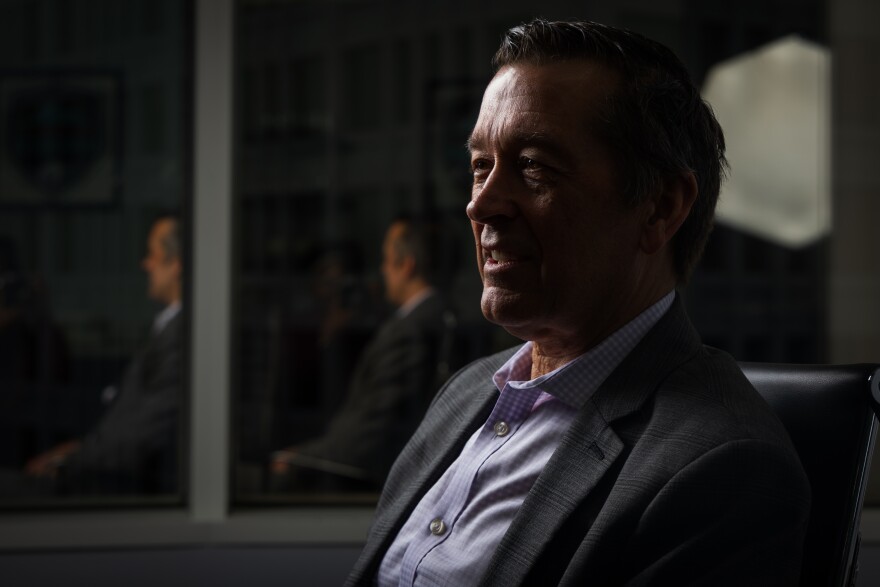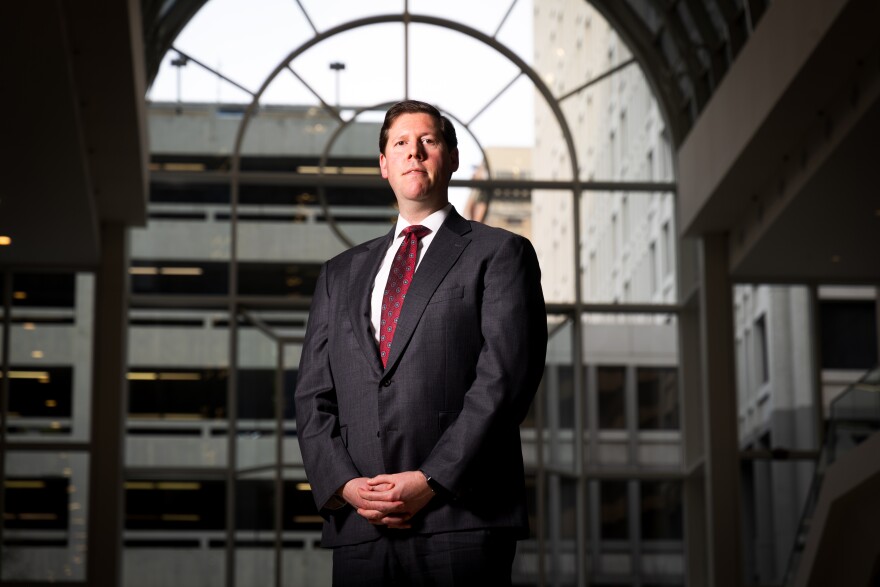Language General Assembly legislators used in amendments to Gov. Glenn Youngkin’s budget proposal could protect their changes from one of the governor’s strongest powers: the line-item veto. But two legal officials in former administrations say the law isn’t clear on how far the governor’s veto powers go — and in a partisan climate, the governor could push those powers.
The budget the General Assembly sent to Youngkin has two provisions that the governor opposes: a sales tax hike through the removal of exemptions on goods and services purchased online and a requirement that Virginia rejoin a regional carbon market.
Money appropriated in the state budget bill often includes conditions attached to specific items, such as how funds can be spent for a project or program. The budget conditions supersede existing state law while the budget is in effect.
“If the governor is going on legal precedent, you would have to line-item [veto] the money part, in addition to the conditions attached to the money, not just the conditions. But of course, that's a gray area,” said Jerry Kilgore, a Republican who was attorney general from 2002 to 2005. “The governor may want to figure that out, have the courts figure that out.”
The sales tax hike is included in an item alongside other state tax policies, and the requirement that the commonwealth rejoin the Regional Greenhouse Gas Initiative is part of the Department of Environmental Quality’s operating budget.
The RGGI requirement also contains provisions that could jeopardize funding for other departments, wrote Noah Sullivan, one-time counsel to former Democratic Gov. Terry McAuliffe.
“I think the governor, if he vetoes RGGI, he will do it in accordance with what his authority allows him to do,” said Del. Luke Torian (D-Prince William), the chair of the House Appropriations Committee, without defining those powers.

Historically speaking
According to the Virginia Constitution, “The Governor shall have the power to veto any particular item or items of an appropriation bill, but the veto shall not affect the item or items to which he does not object. The item or items objected to shall not take effect except in the manner provided in this section for a bill vetoed by the Governor.”
While the Supreme Court of Virginia ruled on the issue in the 1940 case Commonwealth v. Dodson, its decision has not directly been tested in recent years. A 2008 Virginia Supreme Court case dealt with related legal issues in budget provisions; attorneys who argued on both sides of that case are now SCOVA justices.
In its 1940 decision, the court wrote that conditions could not be vetoed separate from budget items.
“It is something which can be lifted bodily from it rather than cut out. No damage can be done to the surrounding legislative tissue, nor should any scar tissue result therefrom,” the court’s opinion read.
During an unsuccessful attempt to expand Medicaid, former Democratic Gov. Terry McAuliffe challenged the Legislature over a 2014 budget amendment that expanded beyond the item it was attached to.
“What we were doing was trying to limit kind of the gray areas where the authority and power of the governor was — or where he thought it was at the time — to remind him that it is the Legislature that appropriates and he couldn't do it on his own,” said Republican Sen. Bill Stanley (R-Martinsville), who introduced the amendment.
At the time, Republican House Speaker William J. Howell (R-Stafford) ruled that McAuliffe’s veto was unconstitutional and refused to hear it. McAuliffe could have sued but did not.
“It never came to loggerheads, because at the end of the day, without the Legislature's approval of money for Medicaid expansion, it seemed like that would not be a fight that the governor wanted to have,” said Sullivan, the former McAuliffe attorney. “It was kind of an institutional standoff that never reached a point at which it needed to be decided.”
Democratic Gov. Ralph Northam also did not exercise a veto against budget provisions included by Republicans that would have restricted the commonwealth from joining RGGI.
A test of Youngkin’s veto powers in the courts would mean constitutional questions being added to the budget debate.

Line-item ‘gray area’
If a budget deal fails to materialize during the April 17 reconvened session, the governor and Legislature would have to come to an agreement before a potential government shutdown in July.
Youngkin hasn’t ruled out vetoing the entire budget if his priorities aren’t included.
At events, the governor’s called Democrats’ proposal the “Backward Budget” and indicated he could veto their priorities in retaliation for leaving his to die in the Legislature.
But the RGGI and tax provisions are embedded in the budget, restricting how he can respond.
Stanley said including policies, like re-entering RGGI, in the budget was “bootstrapping a political agenda to the regular work of the General Assembly, which is to fund our agencies.”
Sullivan, the former McAuliffe attorney, said the issue also relates to separation of powers.
“I think things have gotten to a point where the governor really cannot just say, ‘Sure.’ Because if the governor does not assert some authority to push back, then what would stop the Legislature from just putting everything it wants and he doesn't like into the budget,” he said.
Likelihood of a budget deal
Kilgore, the former attorney general, said the budget standoff was just politics.
“Politics is behind all of it. And eventually, calmer heads rule, and people get together and come up with the budget,” he said.
Stanley echoed that sentiment.
“Usually, the budget goes into overtime. But let me be clear, I don't think that we're going to have a Virginia shutdown of our government — that's not going to happen,” he said.
Last year, the Legislature passed a “skinny budget,” funding legally required obligations before agreeing to budget amendments in September. Since it was an odd-numbered year — and Virginia’s two-year budget is submitted during even years — there was no possibility of a shutdown.
The Richmond Times-Dispatch reported Democrats spoke with Youngkin about amendments he could make by Monday, after having expressed incredulity over the governor’s desire to negotiate the budget.
Two delegates often tasked with parliamentary matters did not provide comment for this article: Del. Bobby Orrock (R-Caroline) declined to comment; and Del. Marcus Simon (D-Fairfax) did not respond to a question sent by text.
Speaker of the House Don Scott was not available for an interview, a spokesperson said. And Senate Majority Leader Scott Surovell could not be reached for comment.
The governor’s press office did not respond to a request for comment.
VPM News questions for Gov. Glenn Youngkin
1. How does the governor understand his veto powers?
2. Is it within his powers to issue line-item vetoes on specific conditions connected to budgetary items?
3. Does he plan to do that?



